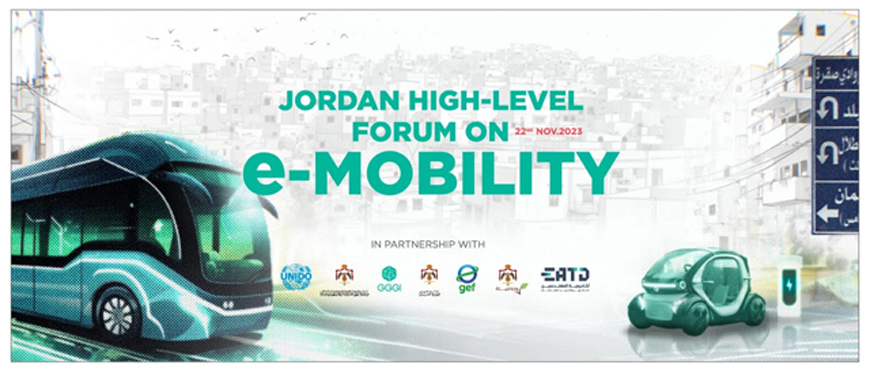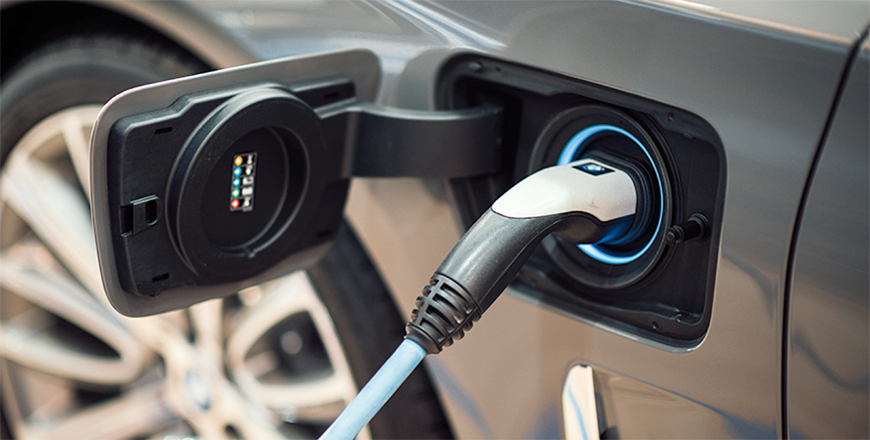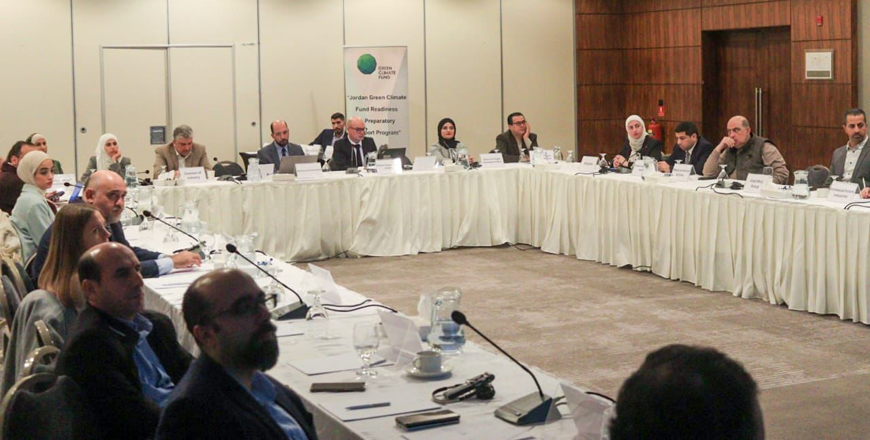You are here
High-Level Forum on E-Mobility launches in Jordan to accelerate green transport transition
By Mays Ibrahim Mustafa - Nov 22,2023 - Last updated at Nov 24,2023

The first High-Level Forum on E-Mobility in Jordan was launched on Wednesday, bringing together stakeholders from various sectors to pave the path for accelerating the transition towards green transport in Jordan (Photo courtesy of GGGI)
AMMAN — The first High-Level Forum on E-Mobility in Jordan was launched on Wednesday, bringing together stakeholders from various sectors to pave the path for accelerating the transition towards green transport in Jordan.
The forum comes as part of the “Integrated adoption of electric mobility in Jordan” project, overseen by the Ministry of Environment, and funded by the Global Environment Facility, the United Nations Industrial Development Organisation (UNIDO) and the Global Green Growth Institute (GGGI).
Secretary-General of the Ministry of Environment Mohammed Khashashneh stressed in his address that an e-mobility transition can help support national goals to reduce greenhouse gas emissions by 31 per cent by the year 2030.
He expressed hope that the COP28, which is set to take place in the UAE at the end of this month, will result in decisions that will contribute to enhancing the efficiency of climate action in developing countries, through fostering climate finance flows, and bringing about bilateral cooperation opportunities with other countries in various areas, including transport.
Secretary-General of Ministry of Energy and Mineral Resources Amani Azzam stressed the importance of effective collaborations between all relevant entities in the public and private sector to achieve national e-mobility goals.
She added that promoting e-mobility aligns with the goals of the Jordan Energy Strategy 2020-2030, which aims to increase energy efficiency by 9 per cent and reduce carbon emissions by 10 per cent.
Considering that the transport sector accounts for roughly 45 per cent of energy consumption in Jordan, the transition towards e-mobility will “undoubtedly” help reduce its greenhouse gas emissions, if it is accompanied with the use of renewable energy to operate charging stations, Azzam said.
The number of electric vehicles (EVs) in Jordan reached nearly 48,000 by the end of 2022, and it is expected to increase to approximately 90,000 by the end of this year, according to Azzam.
She noted that it is necessary to take proactive measures to address the expected increase in electricity demand on power grids in Jordan, due to the rising popularity of EVs.
Ministry of Transport Secretary-General Osama Karadsheh said that Jordan’s e-mobility transition springs from its commitment to meet its environmental responsibilities.
He added that the transportation sector generates 28 per cent of greenhouse gas emissions, which means that adopting e-mobility, will help in reducing pollution, improving air quality and contributing to climate change mitigation in addition to saving energy costs.
He also highlighted ongoing projects lead by the Ministry of Transport to promote green transport in Jordan, including the Bus Rapid Transit project between Amman and Zarqa, and the urban transport project between Irbid and Zarqa, in addition to monitoring and tracking the use of government vehicles.
The Ministry of Transport is also currently developing a national strategy for transport, which will include areas focused on climate change and the environment, according to Karadsheh.
UNIDO’s Representative to Jordan Sulafa Mdanat said that EVs, “if powered by renewable energy”, can play a very important role in helping reach targets to reduce greenhouse gas emissions.
In line with the Paris Agreement that came into force in 2016, greenhouse gas emissions need to be reduced by 45 per cent by 2030, reaching net zero by 2050, according to Mdanat.
She noted that the transport sector is responsible for approximately one quarter of greenhouse gas emissions, and three-quarters of these come from road vehicles.
Mdanat also highlighted the role UNIDO plays in supporting the global transition towards more sustainable transport systems, such as helping countries, including Jordan, leverage global climate funds to advance their own national climate action agenda.
“We are well aware that scaling up the adoption of electric mobility at the national level is quite a complex task, and it takes a very strong and effective partnership between all parties, not only in the design of these projects, but also in their implementation,” she said, stressing the importance of the “effective involvement” of the private sector.
GGGI Country Representative to Jordan Christophe Assicot overviewed the different types of tools that can be leveraged to accelerate the e-mobility transition in Jordan, including technological innovation, policy incentives, financing, knowledge-sharing and piloting.
Highlighted options include introducing direct subsidies, preferential lanes accessible to EVs and low carbon zones, in addition to implementing EV retrofitting, which refers to converting an existing petrol or diesel vehicle into an EV.
Assicot also noted that e-mobility projects can benefit from climate finance and carbon finance due to their contribution to reducing greenhouse gas emissions.
It is expected that the first e-mobility pilot will take place next year in the tourism sector through introducing around 20 electric buses in the tourism site of Petra, according to Assicot.
He further noted that the Kingdom’s e-mobility transition is an opportunity to create various types of green jobs, which can help address the unemployment challenges facing Jordan.
Related Articles
AMMAN — The Public-Private Dialogue on Sustainable Transport in the Tourism Sector, which took place on Tuesday, focused on better understan
AMMAN — The Kingdom’s target to reduce greenhouse gas emissions by 31 per cent by the year 2030 requires an estimated JD7.5 billion in inves
AMMAN — The private sector is a key partner in fulfilling national goals related to climate change adaptation and mitigation, said Director


















